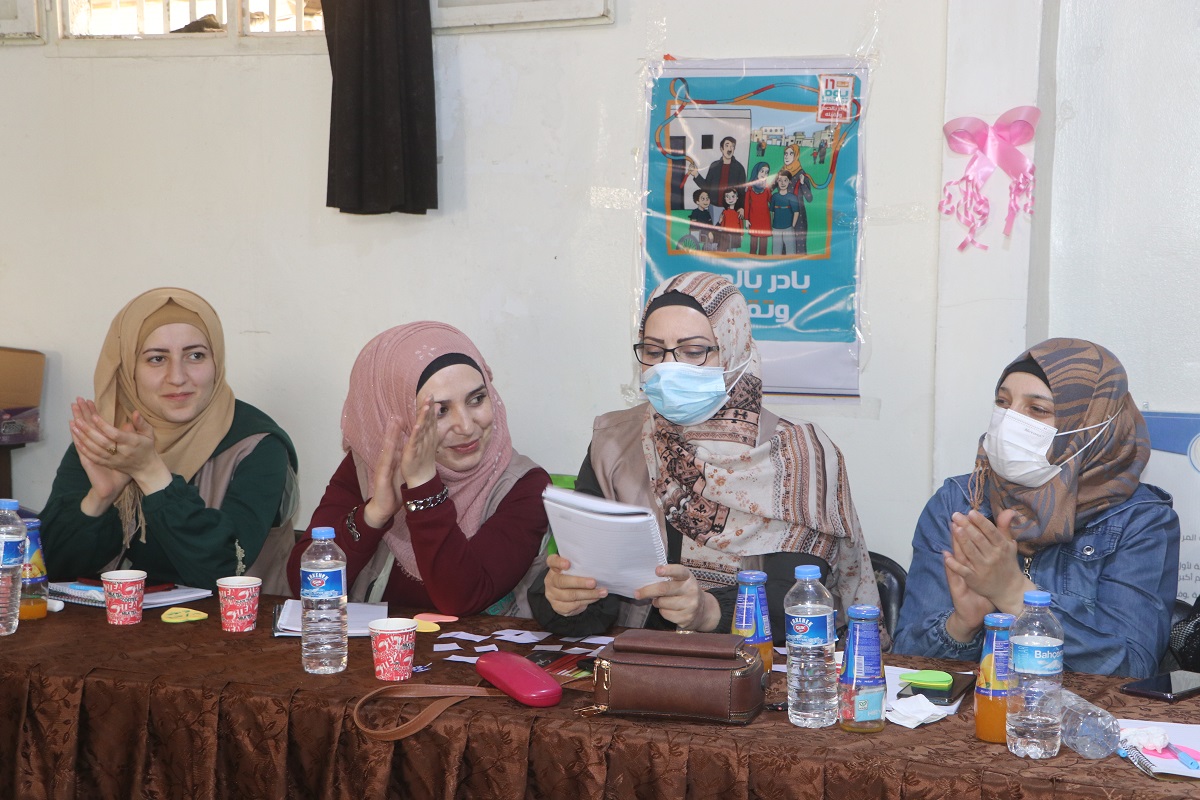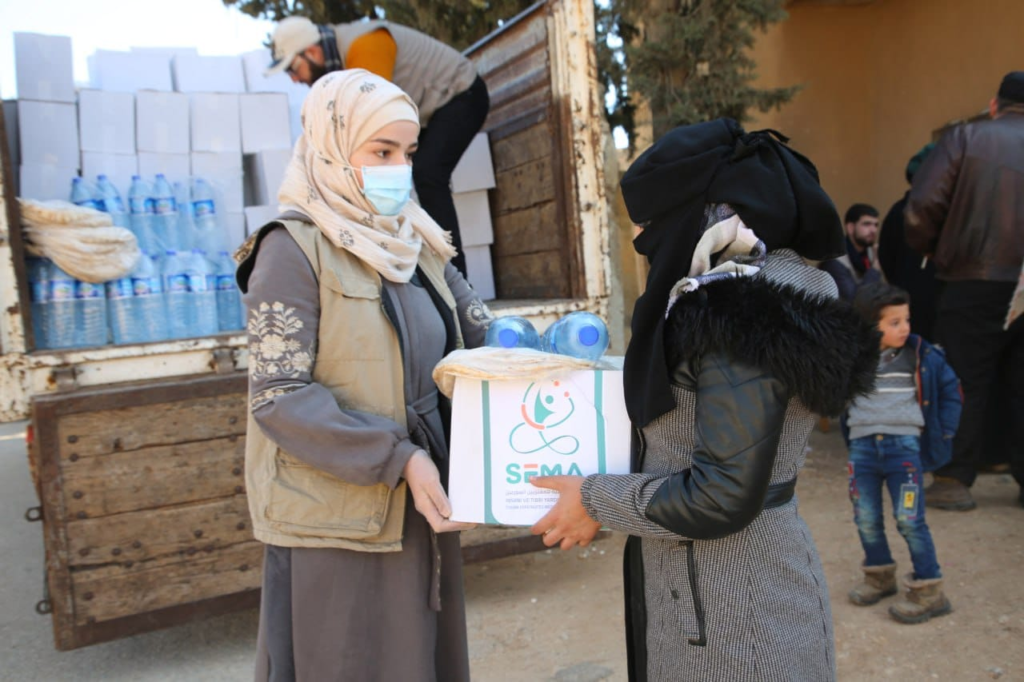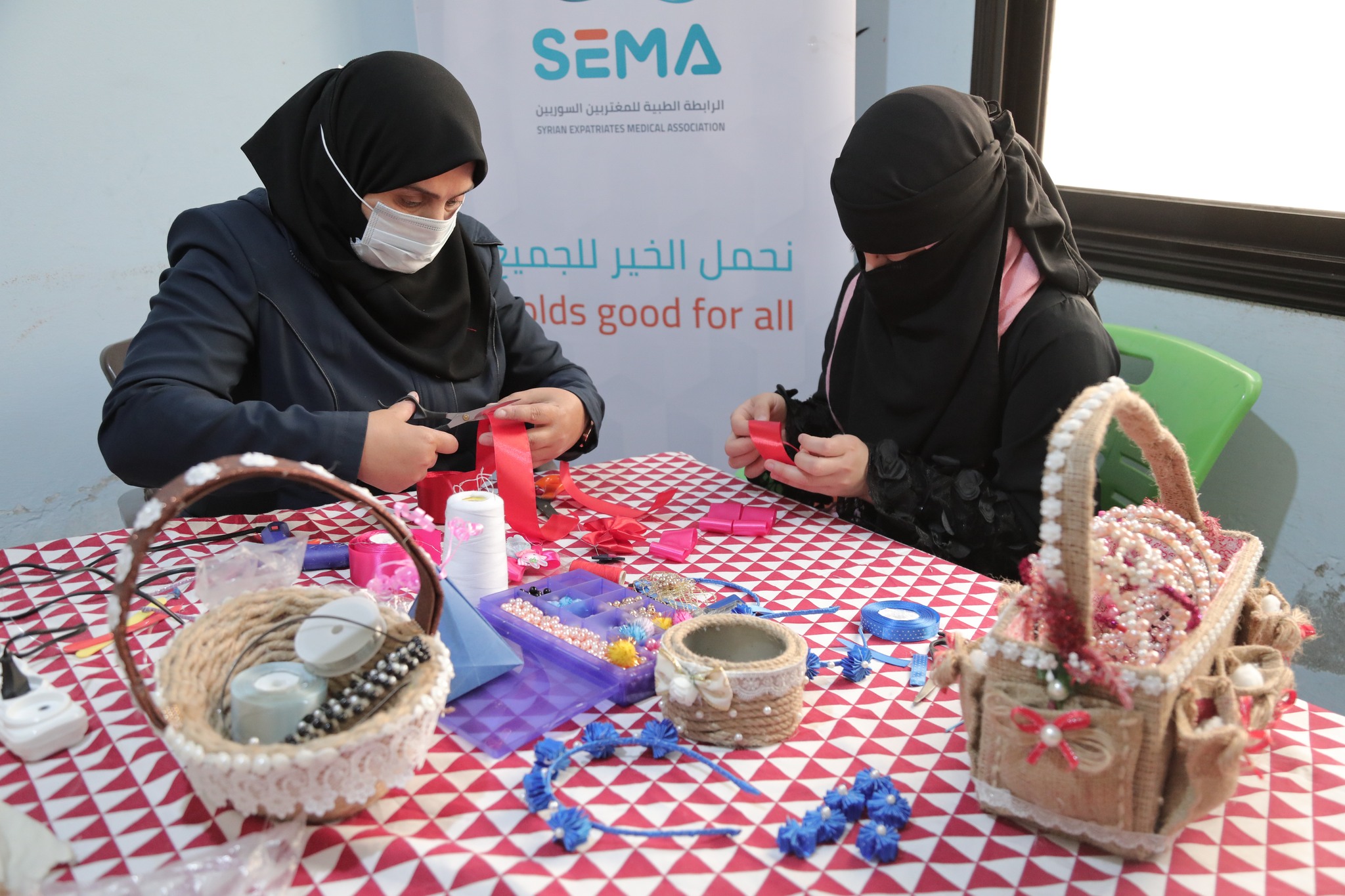Refugee women are among the most vulnerable categories to mental health issues due to the hardships they face on a daily basis as well as their traumatic experiences of displacement.
Lack of resources, cultural stigma, and gender-based discrimination are among the challenges that contribute to those women’s lack of access to mental healthcare facilities.
This article will explore the different aspects related to Syrian refugee women’s mental health issues, including the practices of trauma-informed care and challenges to accessing such facilities, as well as The Syrian Expatriate Medical Association (SEMA) efforts to address such an issue.
The impact of trauma on the mental health of refugee women
Trauma has a significant impact on the mental health of Syrian refugee women.
The traumatic experiences faced by Syrian refugee women as a result of migration and displacement can have devastating consequences for their mental health, including post-traumatic stress disorder (PTSD), anxiety, depression, and other mental health issues.
Additionally, the hard circumstances of refugee camps and the obstacles that women face, including violence, overcrowding, and a lack of resources, can further exacerbate their mental health issues.
Gender-based discrimination and limited access to services and resources, such as healthcare and education, can contribute to mental health issues.
Furthermore, there are gender-based factors that influence Syrian refugee women’s mental well-being.

Cultural and gender-specific factors influencing refugee women’s mental health
Cultural and gender-specific factors that impact women’s mental health include the following:
- Language barriers: Many refugees and displaced Syrian women could be exposed to feelings of isolation and distress as a result of the lack of the necessary language skills to integrate into the host countries.
- Trauma: Prior to their arrival in refugee camps, many women experienced traumatic experiences due to war, violence, and displacement. Such experiences can lead to mental issues such as anxiety and PTSD.
- Lack of access to healthcare facilities: Limited access to adequate healthcare services in refugee camps may lead to aggravating refugee women’s mental health issues.
- Social exclusion: Syrian refugee women may experience forms of social exclusion as a result of their gender and cultural backgrounds, leading to a myriad of mental issues, such as low self-esteem and isolation.
- Inadequate access to support systems: Due to traditional gender roles, many Syrian women could lack access to support systems compared to those available to men.
Therefore, this category of women is in need of trauma-informed care programs that particularly cater to their special mental health requirements.
The need for trauma-informed care
In order to address the mental health issues experienced by Syrian refugee women across refugee camps, they need to be provided with trauma-informed care.
In particular, Syrian refugee women need to be provided with a safe and secure environment in which there is an understanding of the unique cultural and gender-based traumas they face.
The principles of trauma-informed care
There are many guidelines and principles that should be adopted in order to provide Syrian refugee women with trauma-informed care specifically tailored to their needs.
Such guidelines and principles include the following:
- Respecting their rights, values, beliefs, and cultural backgrounds.
- Ensuring that those women’s physical, emotional, and mental safety is taken into account.
- Acknowledging the severity and nature of Syrian refugee women’s traumas and providing them with a safe and supportive environment to express their feelings as part of their treatment.
- Empowering and supporting those women to take control of their own mental well-being.
- Enhancing the accessibility of Syrian women in refugee camps to resources, treatment, and support services.
Best practices for offering trauma-informed care
Civil society organizations, such as global charities and non-profits, should follow the below practices in order to address the specific needs of refugee women for trauma-informed care.
Creating a safe and supportive environment
Creating a safe, non-judgmental environment where women can feel comfortable expressing their feelings is very crucial to addressing their mental health needs.
Those women need to feel safe talking about their stories without any cultural or gender-specific discrimination or prejudice.
In order to do so, it is crucial to respect the cultural differences and beliefs of Syrian women and offer them a culturally appropriate care program.
Building trust and rapport with refugee women
Building trust with refugee women could be done by showing them empathy and understanding in order to make them feel supported and appreciated.
Building trust can also be provided to Syrian women by giving them access to the necessary resources, such as medical and mental healthcare, employment opportunities, food and housing, and legal assistance.
Promoting self-care and resilience
One of the most crucial ways to help Syrian refugee women recover from their displacement-linked traumas is by promoting their self-care and resilience.
Such an important treatment mechanism could be achieved by encouraging refugee women who are victims of mental trauma to focus on positive aspects of their culture and experiences and build resilience.
Challenges and considerations in providing mental health support for refugee women
Nevertheless, there are several challenges that hinder Syrian refugee women’s access to mental health support.
To better enhance those women’s access to mental health services and improve their psychological well-being, these challenges need to be effectively addressed.
Language barriers and communication challenges
The language barrier is considered to be one of the most serious challenges contributing to the mental health issues of refugee women.
This is because such a barrier stands in the way of better communication between refugee women and mental health providers.
Stigma and cultural beliefs around mental health
Refugee camps are often rife with cultural beliefs that stigmatize mental health issues.
Such cultural beliefs make it difficult for women refugees to seek help and treatment.
In addition, such beliefs contribute to the lack of access to mental health facilities in refugee settings.
Limited access to mental health resources
Many victims of trauma across refugee camps are not able to access mental health services due to geographical distance or a lack of transportation.
In addition, such refugee settings suffer from poor mental healthcare services and facilities due to a lack of resources.

SEMA’s role in addressing refugee women’s mental health issues
At SEMA, we make sure to provide the affected women refugees with the mental healthcare they need.
We recognize the severity of the traumatic experiences that refugees have faced due to displacement and the hardships they are going through on a regular basis.
In cooperation with local authorities and mental healthcare providers, we make sure to develop mental healthcare programs specifically tailored to address the psychological and emotional traumas that women refugees face.
In that sense, SEMA prides itself on being one of the first humanitarian relief organizations that adopted the approach of Gender-Based Violence (GBV) in health facilities across refugee communities.
Through such an approach, we ensure that refugee women who are victims of violence get the psychological and mental healthcare as well as the protection they need.
You can also help us by supporting our efforts to improve the mental well-being of refugee women by donating to our campaigns and projects today.
FAQ
What are the mental health issues of refugees?
Refugees face mental health issues due to displacement and trauma. Common issues include:
– PTSD: violence, persecution, war lead to intrusive memories, nightmares, anxiety.
– Depression: loss, separation, uncertainty cause sadness, hopelessness, despair.
– Anxiety Disorders: future uncertainty leads to worry, fear, panic attacks.
– Adjustment Disorders: challenges in new culture, language result in emotional and behavioral symptoms.
– Substance Abuse: coping with trauma through substances worsens mental health.
– Somatization Disorders: psychological distress manifests as physical symptoms.
– Sleep Disorders: disrupted sleep, nightmares due to trauma and stress. Access to culturally sensitive mental health services is crucial for refugee well-being.
What are the psychological effects of displacement?
Displacement impacts individuals psychologically, leading to:
– Trauma and PTSD: Violence, separation cause intrusive memories, nightmares, hypervigilance.
– Loss and Grief: Leaving behind homes, communities results in profound grief, disconnection.
– Anxiety and Uncertainty: Safety, legal concerns trigger constant worry and stress.
– Depression and Hopelessness: Challenges bring hopelessness, loss of motivation.
– Social Isolation and Loneliness: Separation leads to isolation, loss of support networks.
– Cultural Dislocation and Identity Issues: Disruption of cultural identity causes confusion, displacement.
– Resettlement Challenges: Adapting to new environment brings stress and difficulties.
– Addressing these effects is crucial for well-being. Access to mental health services and community support aids recovery and adjustment.
What are some of the most common mental health issues experienced by refugee women?
Refugee women face specific mental health challenges:
PTSD: Trauma leads to intrusive memories, nightmares, emotional distress.
Depression: Displacement causes upheaval, loss, uncertainty, exacerbating depression.
Anxiety Disorders: Displacement-related stress triggers anxiety, panic attacks, social anxiety.
GBV Trauma: Gender-based violence causes psychological effects.
Reproductive Health and Maternal Mental Health: Limited access to healthcare increases perinatal mental health risks.
Substance Abuse: Coping with trauma through substance abuse worsens mental health.
Cultural Adjustment and Identity Issues: Adapting to new culture, loss of support networks, gender role challenges.
Culturally sensitive care, gender-sensitive support, and comprehensive healthcare are crucial for their well-being.
What are some of the strategies that can be used to support the mental health of refugee women?
Supporting mental health of refugee women:
1- Accessible mental health services: Affordable, culturally appropriate, with interpretation and gender-specific considerations.
2- Trauma-informed care: Safe, supportive environment that empowers, builds trust, and promotes healing.
3- Psychoeducation: Increase awareness, reduce stigma, and empower women to seek help.
4- Community support and integration: Foster social networks, reduce isolation, promote belonging.
5- Gender-sensitive approaches: Address gender-based violence, reproductive health, cultural norms, and empower women’s rights.
6- Cultural and linguistic competence: Understand diverse backgrounds, beliefs, and provide effective support.
7- Collaboration and coordination: Multi-sectoral approach for holistic support.
8- Empowerment and skill building: Enhance resilience, coping strategies, and self-expression.
8- Address structural and socioeconomic factors: Advocate for policies addressing discrimination, poverty, housing, education, and employment.
9- Family and social support: Involve families, promote communication, and engage community leaders in the support process.
References
Read More:



